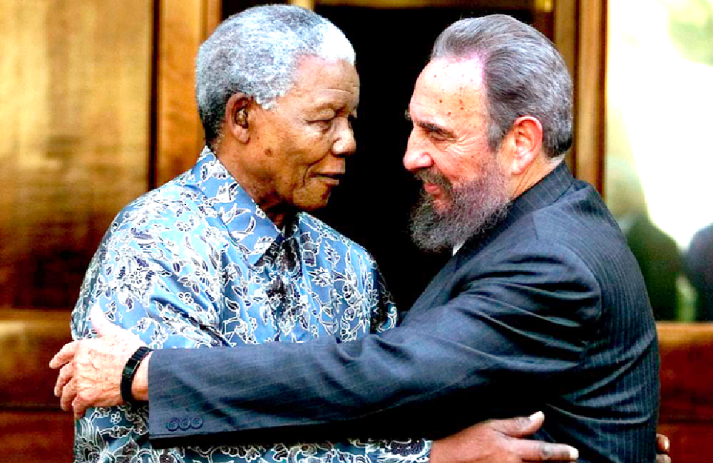
Fidel Castro. His legacy for Africa
'Fidel was a friend, a comrade. He is an unforgettable figure to us. His memory will be always remembered in Angola,' said Angola’s Vice President, Manuel Vicente, after signing the book of condolence dedicated to Fidel Castro at the residency of the Cuban Ambassador to Angola.
Advertisement
I believe the first question that many would ask after reading this quotation is, why would an African leader speak so highly of the late President of Cuba, which is far away from the continent of Africa? For the younger generation, names that immediately come to mind when we talk about the liberation struggle of Africa include our own Dr Kwame Nkrumah, Congo’s Patrice Lumumba, Jomo Kenyatta of Kenya, Emperor Haile Selassie of Ethiopia, Namibia’s Sam Nujoma, Gamel Abdul Nasser of Egypt, among others.
Hardly does the name of the late President Fidel Castro from the Latin American country of Cuba come to mind. It is worthy to mention that if there was one region that benefited from the rise of Castro as leader of Cuba, it was Africa. At a time when Africa had become the battleground during the Cold War, Cuba under President Castro emerged as a friend of liberation movements, sending soldiers, doctors and teachers to some African countries to help in the liberation struggle.
Indeed, the story of Africa’s liberation struggle would be incomplete without the mention of Castro and that is why Africa needs to celebrate him even in death. Castro, Cuba’s revolutionary leader’s ashes were laid to rest in the Cuban city of Santiago on December 4, nine days after his death, aged 90. Castro was the central figure in the Cuban Revolution (1956-1959), which removed dictator Fulgencio Batista from power and replaced him with a communist regime friendly to the Soviet Union. With Castro gone, Africa’s liberation leaders have lost a loyal friend and a hero.
Support in Angolan liberation
When the apartheid government, aided by the United States, attacked Angola, it was Castro who came to their aid. Responding to calls for help from the Angolan Marxist guerrilla leader, Agostinho Neto, who had seized Luanda during a bloody war from the Portuguese, Castro sent 36,000 troops who succeeded in pushing the South African soldiers back. It also trained African fighters. Cuban soldiers and officers fought hand-in-hand with their African counterparts for Angola’s independence.
In Namibia, Cuban soldiers are documented to have fought alongside the Namibians until apartheid South Africa agreed to withdraw and grant the country independence.
Castro’s support for Africa’s liberation was not just limited to Angola and Namibia: He also supported other leaders, including Namibia’s Sam Nujoma, South Africa’s Nelson Mandela, Libya’s Muammar Gaddafi and Zimbabwe’s Robert Mugabe.
Other social programmes
Aside from sending troops to fight in wars against colonialists, Cuba under Castro supported liberation movements on the continent with logistics and technical support. It also sent tens of thousands of Cuban doctors, dentists, nurses, healthcare technicians, academics, teachers and engineers to the continent and elsewhere. Ghana still benefits from the healthcare services provided by Cuban doctors who visit the country on a rotational basis.
Cuba’s support for Africa, however, came at a cost to Cuba. Some 4,300 Cubans are believed to have died in conflicts in Africa, half of them in Angola alone which benefitted so much from Cuba’s support.
Profile of Fidel Castro
Fidel Alejandro Castro Ruz was born on August 13, 1926, near Birán, in Cuba's eastern Oriente Province. He was the third of six children, including his two brothers, Raúl and Ramón; and three sisters, Angela, Emma and Agustina. At age 17 Castro was formally recognised by his father and his name was changed from Ruz to Castro.
Educated in private Jesuit boarding schools, Castro grew up in wealthy circumstances. From an early age, he showed he was intellectually gifted, but he was also somehow a troublemaker. He attended Colegio Dolores in Santiago de Cuba and then El Colegio de Belén in Havana.
After his graduation in the late 1945, Castro entered law school at the University of Havana and became immersed in the climate of Cuban nationalism, anti-imperialism and socialism, focusing his energies more exclusively on politics.
Over the years, Castro had been the target of numerous CIA assassination attempts, an estimated 638 in all, according to Cuban intelligence. Castro's regime has been credited with opening 10,000 new schools and increasing literacy to 98 per cent. Cubans enjoy a universal health-care system, which has decreased infant mortality to 11 deaths in 1,000 (1.1 per cent).
On February 19, 2008, after a long rule, 81-year-old Fidel Castro permanently gave up the Cuban presidency due to his deteriorating physical condition. He handed over power to Raúl, his brother who was 76 years old at the time.



